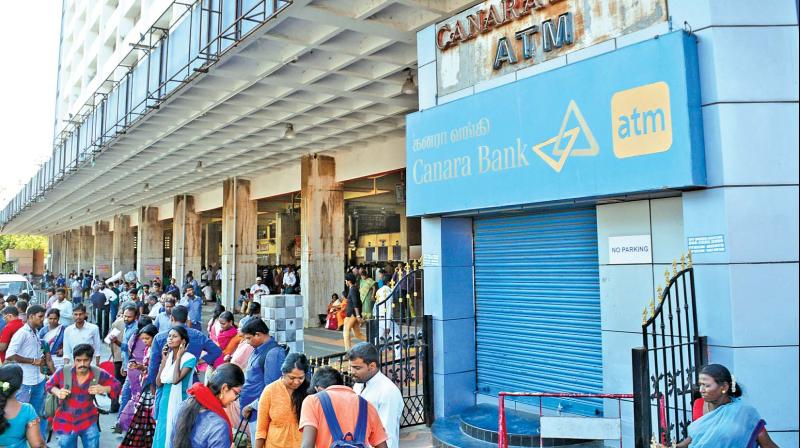Again the misery

CHENNAI: Arya Anil’s recent journey from Chennai Central to Palakkad was not a very pleasant one. With seven ATMs in and around the Central railway station ‘out of service’, her children had to remain hungry through the 10-hour journey.
“Our fellow passengers helped us with food. When I finally got down at Palakkad, I was able to use my ATM card to make payments,” a distressed Arya told Deccan Chronicle. Arya is not alone. She is just one among thousands of people who have been struggling with ATMs not dispensing money and the extremely long queues outside almost every working ATM.
This has brought back memories of the days’ post-demonetisation that made almost every man on the street penniless.
Not just at railway stations, the situation in heavily populated areas of the Chennai city is even worse. Residents of areas such as Perambur, T. Nagar, Guindy and Tambaram tend to roam around in search of functional ATMs.
“We have to go all the way to Tiruvottiyur from Tondiarpet, where we have to stand in queue for half-an-hour or so to collect cash as it is a busy place,” says Reethika S., a resident of Tondiarpet. ATMs are mostly shut down in our area if not, they do not dispense any cash. Most of them do not even notify that they are out of cash, she added.
The cash situation eased in March after the scary four months of November, December, January and February, but it has come back to haunt people. Banks levying charges for withdrawing and depositing cash beyond the permissible limit have only added to their woes.
ATMs at railway stations, metro stations and main bus stops have also downed their shutters. The vestibules near the local railway stations, including Guindy, Chennai Park, St Thomas Mount and Tambaram that tend to have a footfall of lakhs every day, are now non-functional.
“Roaming around for cash for an hour in Perambur Loco, I still could not get enough cash and had to end up going to the bank to get the amount I needed for a family function,” said Pooja Dixit, a resident of Perambur Loco Works, complaining about the non-functional ATMs in the area.
Though cashless payments were very well promoted after demonetisation, it failed to reach even the most significant places like hospitals. It is seen that many hospitals refrain from accepting cards. “My daughter is here for a surgery, for which I need to pay the medical bills. None of the 12 ATMs nearby has been working. How can I leave her alone to go in search of working ATMs,” said Chitra A., in East Tambaram.
While bank officials haven’t given any public notice in this regard and claim to have enough cash, some of them mentioned that outsourcing of loading the cash might be causing the delay. “The State Bank of India bank is loading the cash on its own at some branches instead of outsourcing it like before, which has overburdened the bank in the process,” said an SBI manager.
Operational changes matter, say bankers
As long queues and non-functional ATMs return to harass people five months after demonetisation, bank officials attribute it to operational and configuration changes. Several managers have added that outsourcing the cash-loading process has its own hassles.
“It takes some time to load the ATMs again as we have outsourced agencies working on it and this might be delayed in some cases,” said a State Bank of India branch manager in Chennai, adding that people are drawing more money thus increasing the burden on ATMs.
“The configuration system has been modified and has not been updated accordingly, which seems to be an obstacle in the efficient functioning of ATMs in some areas,” said a manager of Indian Overseas Bank.
However, cash is readily available in banks and people would not face the same situations at the branches, the manager added.
“Cash shortage exists in some states like Andhra Pradesh and Telangana, but Chennai has not been affected,” he continued.
Banks are mulling to carry out the loading process themselves rather than outsourcing it, to cut off the delay for the same. This, officials say, would help to increase the efficiency of the teller machines.

